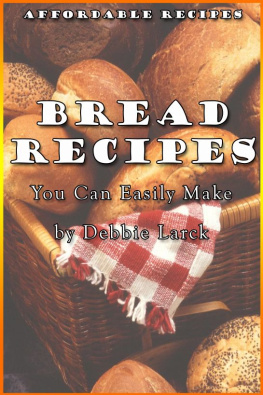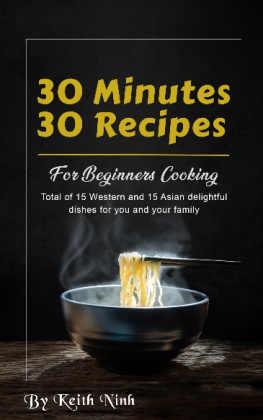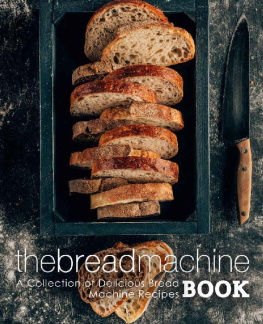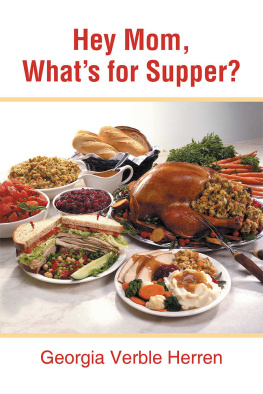Also by Dori Sanders
Clover
Her Own Place
DORI SANDERS
COUNTRY COOKING
RECIPES AND STORIES FROM THE FAMILY FARM STAND

BY DORI SANDERS
consulting editor, John Willoughby
Algonquin Books of Chapel Hill 1995
Published by
ALGONQUIN BOOKS OF CHAPEL HILL
Post Office Box 2225
Chapel Hill, North Carolina 27515-2225
a division of
WORKMAN PUBLISHING
225 Varick Street
New York, New York 10014
1995 by Dori Sanders.
All rights reserved.
Published simultaneously in Canada by Thomas Allen & Son Limited.
Design and illustrations by Robbin Gourley.
LIBRARY Of CONGRESS CATALOGING-IN-PUBLICATION DATA IS AVAILABLE FOR A PREVIOUS EDITION OF THIS WORK.
eISBN: 9781565127265
To my sister Virginia,
who has picked, prepared, and tested
right alongside me from the first page to the very last,
and with enormous gratitude to John Willoughby,
without whom this book would never have been completed
and thats the whole truth!
CONTENTS


INTRODUCTION
I still live on the farm where I was borna farm that has been in our family for more than seventy years. Here in York County, South Carolina, our family spends many hours working togetherplanting and harvesting and running the farm stand where we sell peaches, okra, crowder peas, and all the other wonderful produce we grow. Often when were working we find ourselves talking about the past, and what we seem to remember most is the food.
Whenever we talk about foodor whenever we eat, for that matterwe always think of our Great-Aunt Vestula. Over the years we have shared so many memories of her, and they still surface every time we gather together.
Aunt Vestula worked in the Low Country of South Carolina, down near Charleston, in the earlier part of this century. We dont know exactly where or for whom, but we do know that she worked in the kitchen of a very, very wealthy plantation owner.
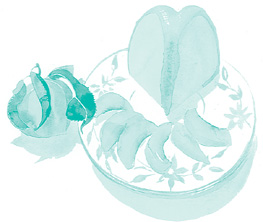
On her visits to our home in Up-Country, Aunt Vestula brought with her the most wonderful and exciting foods we could ever have dreamed of, recipes that used things in ways wed never imagined. Adding just a touch of sherry to this dish, a drop of wine to that, using fresh herbs and capers, grating a smidgen of nutmeg into a soup or a stew, my Aunt Vestula changed the way we thought about cooking.
Recently one of my sisters and I toured South Carolinas Low Country. As we viewed the old plantation mansions, we couldnt help wondering, was it here? was it there? that our Aunt Vestula was introduced to the wonderful things she cooked. What family was it that influenced her cooking methods and the knowledge she passed on to our family? Even as my sister and I traveled on over into Georgia and then back up through South Carolina to our home near the North Carolina border, we kept looking across the long acres of land near every mansion and wondered whether Aunt Vestula had lived in some small house there. We searched for clues but returned home empty-handed.
We still have our memories of her, though. I will never forget the last time Aunt Vestula traveled up from the Low Country to our home. That time it was not for a visit; our Aunt Vestula came to stay. The memory is fresh and vivid in my mind, at once sad and happy. And so I remember, and nearly always, I laugh.

On that last visit, the only things Aunt Vestula brought with her were the most beautiful trunk I had ever seen and the memory of the plantation mistress for whom she had worked. She remembered how the mistress had managed he household, the way she would direct the servants in the morning, the way she ordered her day, the way she expected the meals to be prepared and the table spread.
By the time Aunt Vestula moved in with us, she was too feeble to cook, but she was always in the kitchen when my mama was cooking. During the cold days of the one winter she lived with us, she would sit tall and regal on a cane-bottomed, straight-backed chair in a warm corner near the wood-burning cookstove, her head held high. In the spring and summer she maintained her presence in the kitchen, but her chair was moved to an open window.
Aunt Vestula had many dresses, but it was hard to tell because they all looked so much alike: muted plaids with lots of blue, or plain blue with tiny little flowers. In the winter the dresses were of soft cotton flannel; in the summer they were made of lawn, that soft, airy, old-fashioned fabric, perfect for hot weather.
While my mama cooked, Aunt Vestula tried to instruct her. A most obliging, patient student was my mama. Aunt Vestula often reminded her to pick a few shallots or leeks to saute along with the fresh wild mushrooms, or to be sure to add just a little mild sherry. Aunt Vestula would go on and on, not noticing that my mama usually didnt follow through on anything she said.
But sometimes my mama would cut up an onion or a clove of garlic that she hadnt planned on using. She never added wine because she hardly ever had any, but she would grate a smidgen of nutmeg over meat and vegetables. Aunt Vestula was so accustomed to that taste that my mama was afraid Aunt Vestula would notice if it wasnt added and complain.
During the hot summer afternoons, Aunt Vestula would sometimes sit on the front porch in her wicker rocking chair and gaze across the open fields. From time to time she would call out to my mama that she was late bringing her afternoon tea and biscuits. I dont remember all that went on in the kitchen, but I surely do remember those afternoons on the front porch, when I would wait for Aunt Vestula to give me a bite of her tea cake.
Sometimes Aunt Vestula would worry that the field-workers were thirstysurely they would enjoy a nice cup of tea. But then she would remind herself that there were too many of them, far too many, to serve tea to. My mama said Aunt Vestula sometimes truly believed that she was the mistress of a large plantation and that my mama was the cook, as Aunt Vestula herself had once been.

I dont have to second-guess where my mama got her ideas for the Sunday afternoon silver teas, the box suppers, and the other fancy events of our rural life. I know. My mama once said she so wished she had asked Aunt Vestula all her questions about cooking when she had a chance. I remember Mama voicing her regrets: If only Id asked her how to make this, If only Id asked her how to make that. I remember her wishing she could capture the exact taste of Aunt Vestulas roasted peppers, the liver pudding, the feather-light pumpkin mousse, the sconelike lemon biscuits.
I now understand my mamas regret. Although I pull up what sage wisdom I can from the past, it seems to have few roots, and I wish there were a way I could ask Aunt Vestula some questions of my own. As someone once wrote, So rare had been the chance to learn. So rare the chance to learn. And so soon the opportunity had passed.
Next page

